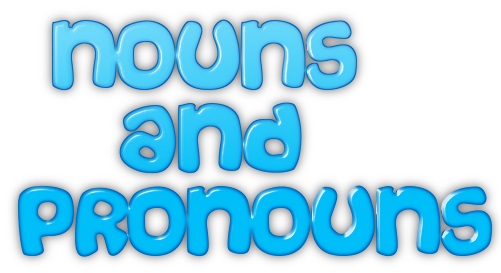

Nouns and pronouns are important parts of a language. Nouns are the objects or people of a sentence. Pronouns substitute for nouns when we want to avoid using the name of the object or person again in the sentence.
Articles are the defining words that come before a noun or pronoun in a sentence. Read on for more information and examples of articles, nouns and pronouns.
Nouns
The noun is the subject of the sentence. It is the person, item, place, feeling or thing in a sentence. For example: the dog / a person / an egg / the atmosphere / a house / an opening.
A proper noun is the name of something, your own name for example, or the name of a city, a film or a day of the week.
Nouns can also be material items, such as a pencil, a cloud or a tractor. Nouns can be places, such as London or the train station. Nouns can also be people or animals, such as John or a cat.
Abstract nouns
Nouns can also be feelings or emotions, such as happiness or satisfaction. Nouns can be personal qualities too, such as humour.
These nouns that describe emotions, qualities or states of being are called abstract nouns.
Articles
An article is the word preceding the noun, telling us if we know the specific noun or if the noun is a general noun.
For example: ‘Lucy is the woman who works at the shop, but there is a man that works there too’. The implication here is that the speaker does not know the man.
‘A’ is the indefinite article in a sentence (not referring to a specific noun, e.g. ‘a dog’) ‘A’ becomes ‘An’ when the noun begins with a vowel (a, e, i, o, u)
‘The’ is the definite article of a sentence (referring to a specific noun, e.g. ‘the dog’)
Countable and Uncountable nouns
Countable nouns refer to those nouns which we can count, for example: books, desks, pens, litres, dogs, cars and people
- Countable nouns can be singular or plural, for example: ‘a dog’, ‘the dogs’.
- Singular countable nouns must use either a definite article (‘the’), an indefinite article (‘a’ or ‘an’) or an adjective pronoun (‘my’, ‘your’, ‘his’, ‘our’ etc.) in front of them in a sentence.
- Plural countable nouns can omit an article or adjective pronoun, for example: ‘I like cakes, ‘He repairs cars at the garage’, ‘They take pens to school’.
- Words denoting quantity can be used with countable nouns. For example: ‘a few’, ‘many’, ‘lots of’, ‘not many’. (E.g. ‘We read lots of books’)
Uncountable nouns refer to those nouns which cannot count, for example, water, happiness, jealousy, news, money, sugar, electricity, trust, time, music, peace.
- Uncountable nouns take a singular verb.
- Indefinite articles are not used with uncountable nouns. Instead we can use the word ‘of’, for example: ‘a pound of sugar’, ‘a bottle of water’, a ‘piece of music‘.
- We can also use the words ‘some’, ‘any’.
Pronouns
Pronouns are sometimes used instead of proper nouns.
Subject pronouns are: I, you, he, she, it, we, they
For example: I closed the door; you can drive the car, they made the cakes.
Object pronouns are: me, you, him, her, it, our, them
For example:
- The present is for me
- That is her scarf
- Our house is large
- This is my computer
- That sofa is for them.
Personal Pronouns
The personal pronouns are:
- my / mine
- your / yours
- his, her / hers, its (no apostrophe)
- our / ours
- their / theirs
Personal pronouns can be either:
- possessive pronouns which come at the end of the sentence. They are: mine, yours, hers / his, ours, theirs. (E.g. ‘the book is mine’, ‘the car is hers’)
- possessive adjectives which are always used just before the noun or the description of the noun. They are: my, your, her / his, our, their. ( E.g. ‘that’s my big, red book’, ‘that’s his new mobile phone’)
Reflexive Pronouns
Reflexive pronouns are: myself, yourself, himself, herself, itself, ourselves, themselves. Reflexive pronouns are rarely used in English.
One occasion where reflexive pronouns are used in English is for emphasis. For example, ‘I made the dinner myself’, ‘I need you to read the book yourself’, ‘He bought the car himself‘.
You could also add more emphasis by adding ‘all by’, for example: ‘The boy painted the picture all by himself, (without the help of anyone else)’.
Other times when reflexive pronouns are used are when the pronoun is the object of a preposition referring to a subject. For example: ‘She enjoyed going on holiday by herself’, ‘He bought a new jumper for himself’.
The last occasion to use reflexive pronouns is when they are used with reflexive verbs. For example: ‘I hope that you enjoy yourself’, ‘They have hurt themselves’, ‘We convinced ourselves to go’.
Now we have explored nouns and pronouns, read all about noun inflections to find out how the endings of nouns can change depending on the context. This extra knowledge will improve your English language skills further.
